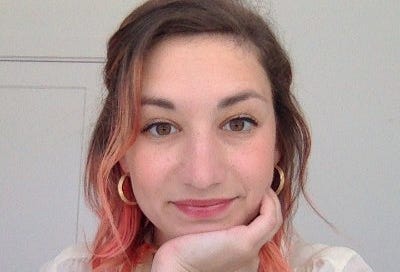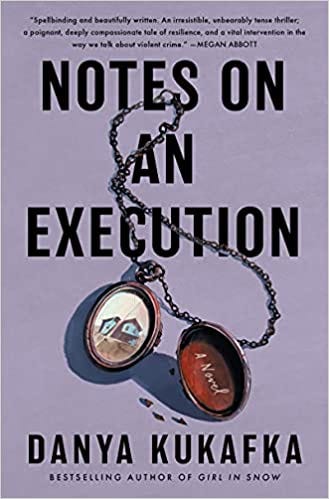Six Questions with Author and Literary Agent Danya Kukafka
She shares exclusive details on her next book
Danya Kukafka has seen all sides of the book industry — as an author, an editor and a literary agent.
Her debut novel, Girl in Snow, about a murder in a small Colorado town, was a national bestseller and translated into more than a dozen languages. As an editor at Riverhead Books, she worked with a who’s who of authors, including Brit Bennett, Lauren Groff, Paula Hawkins and Meg Wolitzer. Today, as an agent, she shepherds authors through the publication process. (She also has an adorable Yorkie/Cattle Dog mix who made a cameo appearance during our interview.)
We had a delightful conversation about the publishing industry, the life of a literary agent and her upcoming book, Notes on Execution. Our conversation has been edited and condensed for clarity.
I really enjoyed Girl in Snow. What can you share about your next book?
It’s called Notes on Execution. This is the first time I’ve shared details of it publicly, so this is exciting. Notes on Execution is a twist on the familiar narrative of the American serial killer. It’s about a serial killer on death row and it’s told from his perspective in the last 12 hours before his execution. It’s not really his book though. This book belongs to the women who have known him throughout his life and are affected by his violence — one of them is his mother, another is his ex-wife’s twin sister, and one is the detective who hunted him. It’s really about the longer tentacles of male American violence and how they affect women.
I was inspired by watching a lot of crime TV. As a high schooler, my mom and I would watch “CSI Miami” or “Law and Order: SVU” every night. We’d make popcorn and tea and watch before bed, after I finished my homework. I always felt like those shows were missing something. They’re sort of formulaic — the detective is haunted and troubled, they go through all this pain to catch the bad guy, who then goes to jail, and that’s the entire arc. I had a feeling there was a deeper story beneath that — that’s why I ended up writing this book.
How did writing your second book compare to writing your first book?
So different. I truly cannot describe to you how different it was. I wrote my first book, as many people do, thinking it would never go anywhere. With my second book, I had this chorus of voices in my head — expectations of what people wanted the book to be. And, when I wrote the first book, I was in school or working full time. The second book, I had left my job to write and found that was just really painful and not for me at all.
I cranked out a draft that I sent to my agent, who I trust more than anyone in the world when it comes to my writing. She sat me down and said ‘This is not working at all. You need to rethink the whole thing.’ That sent me into a true panic spiral and I spent many, many months completely re-envisioning what the book was.
That process of completely scrapping and rethinking was crucial for me. I wrote 12 potential characters before I landed on three women, who I spent three years fleshing out. The book used to take place over a span of like 50 years and now it takes place in 12 hours.
Part of that conversation is what pushed me to pursue a career as literary agent because I wanted to be the person to have those tough conversations and help authors.
Want to receive Q&As like this one — plus weekly book recommendations — in your inbox? Subscribe to What To Read If.
You’re a literary agent with a literary agent. What does an agent do day-to-day?
The quick pitch is: I sell books from authors to publishers, so I look for authors, take on their projects and sell their books to publishers, but the actual day to day is much more complicated than that.
I read a lot — that is mostly the job of an agent. I look for books I would want to find on a bookshelf — books I find compelling, that have interesting concepts or techniques.
Since I’m an author, I only work with a small number of writers. I work with them to edit their manuscripts and then send those manuscripts to publishing houses. Part of the job is knowing the editors at publishing houses and what they like. It’s matchmaking — which I love. Then, there is the paperwork side of the job and negotiations for everything, from film rights to foreign rights.
Finding an agent is a notoriously difficult process for aspiring authors. What advice do you have for them?
If you're at the beginning of the querying process [editor’s note: asking an agent to represent you is called “querying”], my best piece of advice is to go to the bookstore, open every book you can think of that is similar to yours, or that you've loved for any reason at all. Look at the acknowledgments to see who the agent is and make a list based on that. And when you reach out to those agents, tell them what you loved about the work.
The queries I pay most attention to are those in which the author is clearly pitching me for a reason. I appreciate it when I can tell the author has done their research, and when I can tell the author has thought about why their book might be right for me. I always take those more seriously.
You’ve seen the publishing industry from a bunch of different perspectives. What do you wish readers knew about it?
Books take a long time to write and it's a solitary experience for a writer to draft a book. But, once it's in the hands of the publishing house there's just a huge team of people involved. It's like a sort of herculean effort to actually get it on the bookshelf.
I think readers picture that the writer writes the book and then the book comes out, but there’s actually this giant, very complex system behind it. The salesforce, publicists, the marketing team, book designers — they don’t get as much credit for the final product as they should.
Lastly, any books you want to recommend?
I loved God Save the Girls by Kelsey McKinney. There’s something to be said for warmth in the book, and Kelsey McKinney does an incredible job of showing the love between two sisters in a religious community in Texas. It’s so vivid in its descriptions of setting and place, and also in its relationship between two young women, sort of trying to find their way in the modern world; I think it's incredible.
Thanks again to Danya for speaking with me. You can find her on Twitter and Instagram. You can order Girl in Snow now and pre-order Notes on Execution, which comes out on January 25.
What to Read If is a free weekly book recommendation newsletter. Need a rec? Want to gush about a book? Reply to this email, leave a comment or find me on Twitter @elizabethheld.
If you’re reading this on Substack or were forwarded this email, and you’d like to subscribe, click the button below.
Disclosure: I am an affiliate of Bookshop.org and I will earn a commission if you click through and make a purchase.






This was good, thank you. I really enjoy information about the publishing industry, agents, authors, and everything that goes on behind the scenes. If I had things to do over again and I was much younger, I think I'd want a career in publishing. Seems like a dream to me.